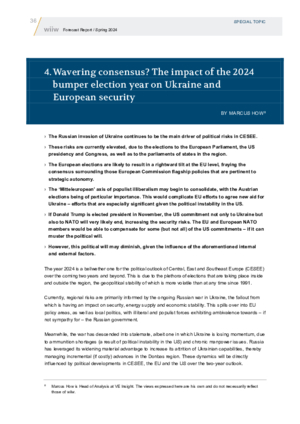wiiw Forecast Reports
Wavering consensus? The impact of the 2024 bumper election year on Ukraine and European security
Marcus How
in: The Crisis is Over, but its Scarring Effects are Hindering Recovery
wiiw Forecast Report No. Spring 2024, April 2024 , pp. 36-42
The Russian invasion of Ukraine continues to be the main driver of political risks in CESEE. These risks are currently elevated, due to the elections to the European Parliament, the US presidency and Congress, as well as to the parliaments of states in the region. The European elections are likely to result in a rightward tilt at the EU level, fraying the consensus surrounding those European Commission flagship policies that are pertinent to strategic autonomy. The ‘Mitteleuropean’ axis of populist illiberalism may begin to consolidate, with the Austrian elections being of particular importance. This would complicate EU efforts to agree new aid for Ukraine – efforts that are especially significant given the political instability in the US. If Donald Trump is elected president in November, the US commitment not only to Ukraine but also to NATO will very likely end, increasing the security risks. The EU and European NATO members would be able to compensate for some (but not all) of the US commitments – if it can muster the political will. However, this political will may diminish, given the influence of the aforementioned internal and external factors.
Reference to wiiw databases: wiiw Annual Database, wiiw Monthly Database
Countries covered: Albania, Austria, Belarus, Bosnia and Herzegovina, Bulgaria, Central and East Europe, CESEE, CIS, Croatia, Czechia, Estonia, Euro Area, European Union, Hungary, Kazakhstan, Kosovo, Latvia, Lithuania, Moldova, Montenegro, North Macedonia, Poland, Romania, Russia, Serbia, Slovakia, Slovenia, Southeast Europe, Turkey, Ukraine, US, Western Balkans
Research Areas: Macroeconomic Analysis and Policy, International Trade, Competitiveness and FDI
